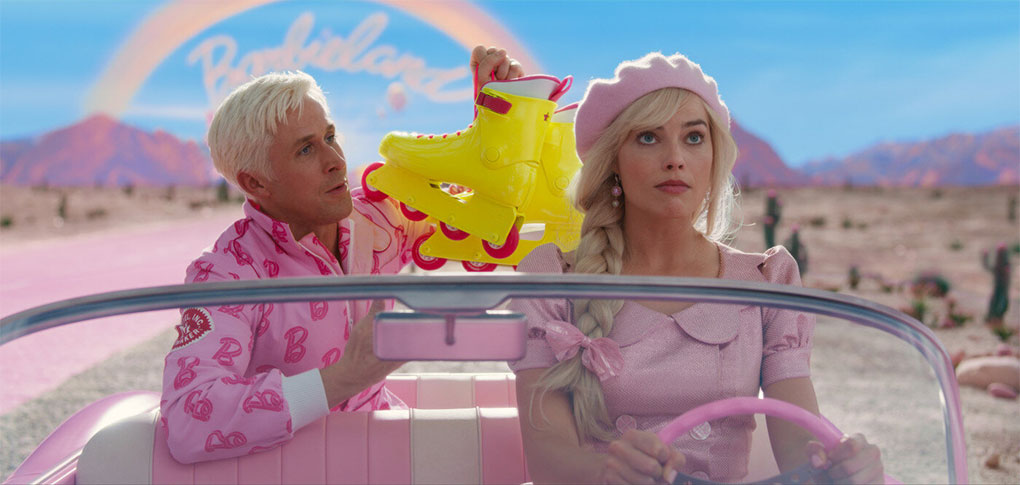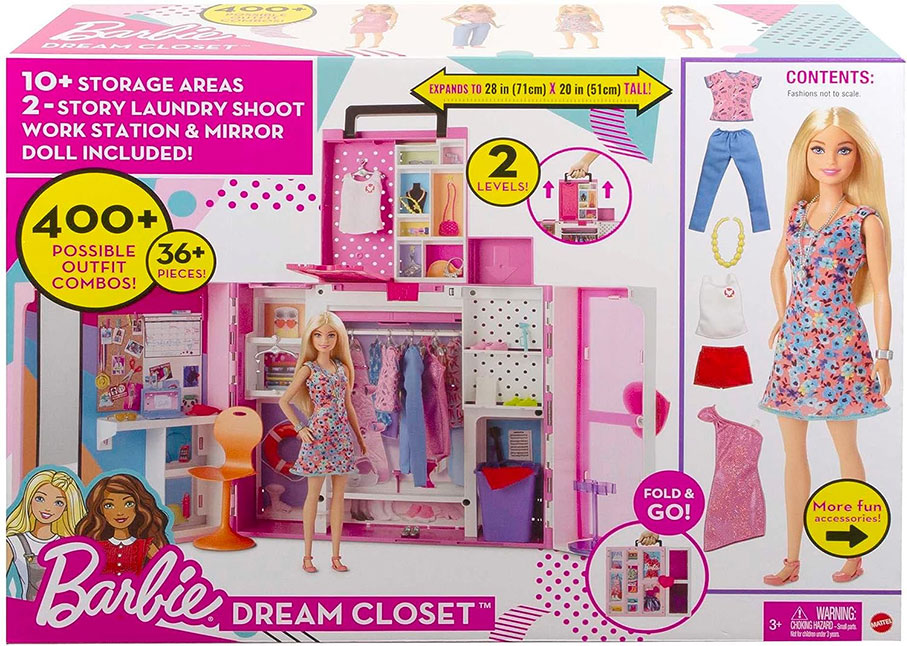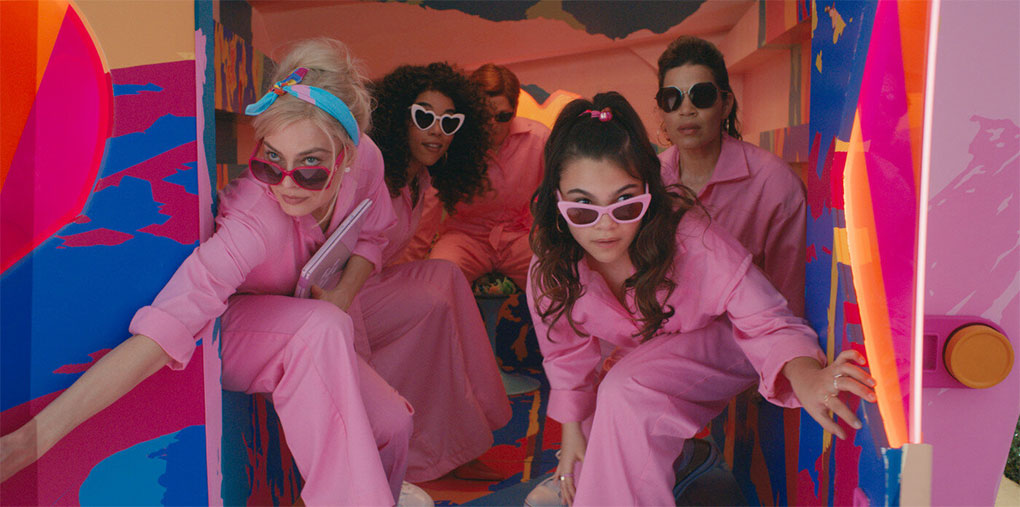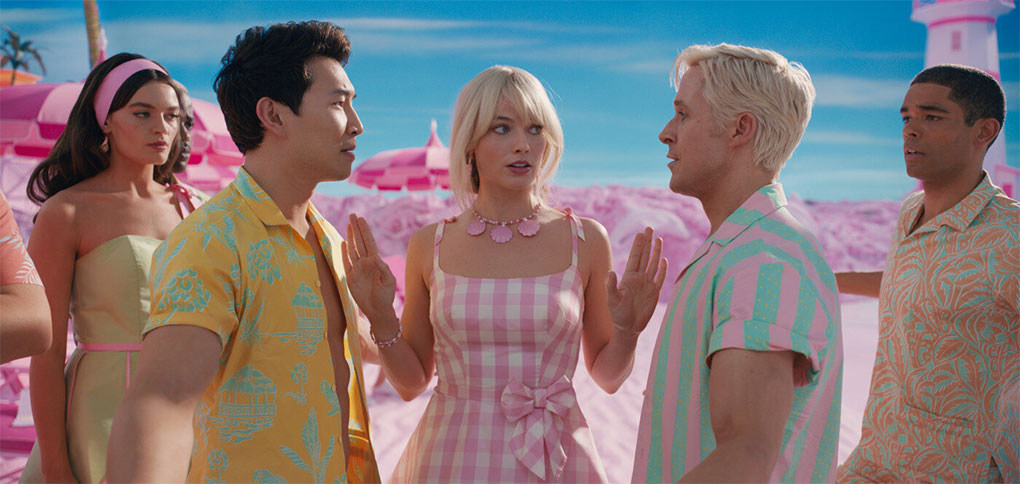|
Foreword: This original review was prompted by my virtual astonishment at the roles men (man dolls and real men) play in the mega-hit Barbie. It aligned my take on the film with some other reviews that picked up a lot of attention, an alignment I wasn’t happy with but if a film elicits a specific response that isn’t an isolated case, it surely needs examining a little closer. To that end I’ve done a bit more research on my main sticking point with the film and hope to present more of a balanced review with some judicial additions to the original. I hope it’s useful.
| |
“My hope for the movie is that it’s an invitation for everybody to be part of the party and let go of the things that aren’t necessarily serving us as either women or men. I hope that in all of that passion, if they see it or engage with it, it can give them some of the relief that it gave other people.” |
| |
Director Greta Gerwig in response to the US
right wing, anti-woke backlash against her film |
| |
“If the roles were reversed, and a male director made a film about how all women were hysterical, neurotic, gold-digging witches, it would be denounced - quite rightly – as deeply offensive and sexist.” |
| |
Sarah Vine, Critic |
| |
“If anything, I thought Barbie was a hit-us-over-the-head positive about men and masculinity. It was thoughtful and conscious about how boys and men watching it would feel, and wanted to give them a similarly powerful message to Barbie's; a measure that was kind but not required. To anyone still moaning that Barbie is ‘anti-men’, I say this in the nicest way possible: grow up.” |
| |
Chloe Laws, Glamour magazine |
Oh, boy. Oh, girl! Where do we start? What exactly do we have here? I thought I’d signed up for some brightly coloured, seriously ironic and fourth wall flirting fun. Ah, no. The context was ripe for knowing humour – our own society seen through the lens of a toy doll from 1959 that purported to be all women to all girls. The trailers and overall marketing had tenderised us to expect something playful and knowing but what the film is and does is Buzz Lightyears from how it was sold. She is not a toy! There are many articles denouncing those who saw the movie as a pink, plastic anthem of misandry. There are many reviews dumbfounded by how dumb and without agency Barbie’s male characters are. There are as many articles about how the pendulum has to be yanked to one polarised extreme in order the reset it to the centre ground. The fantastic elements as in the definition: “imaginative or fanciful; remote from reality,” allow the film to get away with purdah (as in its meaning of a state of seclusion or secrecy not the associated male power play). Screened off from the real world, women dolls in Barbieland are able to preside over their own perfect society unencumbered by men who represent nothing more than adoring clowns who compete for the women’s attention in the most adolescent ways. It’s important to note that this is Barbieland and this is the way things are and are specifically designed to be. This is Barbie status quo, something I may not have picked up on. While the Barbies (and there are a great many of them) range from a president governing from the Pink House, naturally, literary award winners, doctors and lawyers and all manner of responsible members of a perfect, plastic society, the Kens are squabbling children, desperate for female attention. They occupy no positions of power here, (Ken’s job is summarised by a location, ‘beach’), and all of them are simply servants to female attention. If I ever hear the name ‘Barbie’ again after two hours of the name’s endless repetition, it’ll not be out of choice.

If some people are writing about how the movie has been misjudged and is not actually a constant and overwhelming critique of being a human male, then why were the obviously intelligent filmmakers not aware of how their movie may have been interpreted? Greta Gerwig, the writer/director and co-writer (and partner) Noel Baumbach could not possibly be unaware of how this anti-men interpretation could be used as a club to beat the film with. Every time I want to cut the film some slack, it doubles down on the women-amazing, men-shite trope and weakens the film despite the clever humour employed. There were so many aspects of the film that were positive and funny and knowing and ‘meta’ to use the current parlance but when the house of cards is built on a foundation of paper, it’s ever so easy to blow the enterprise away. Let’s examine the common responses to this all too easy surface reading.
Barbie is anti-patriarchy but pro-men. Its withering critique of a man’s world is aimed at the system in place that continues to treat women as unequal to men and expects men to show an ingrained anti-woman bias. Violently so. OK. Watch Barbie and Ken’s arrival at Venice beach (‘the real world’) where they are continually assaulted by the most boorish of men with one even slapping Barbie’s ass. It’s in the trailer. Is that ‘the real world’? Is that the patriarchy? Surely it’s just the worst aspects of the human male amplified for what purpose? To upset Barbie and incentivise Ken to become a ‘real’ asshole? There are other views that insist Barbie is not Political but merely playful and not to be taken seriously and how can it show misandry when Ken is the stand out character who completes not one but two arcs? I agree that taking Barbie seriously may be a touch on the heavy-handed side and Ryan Gosling probably steals the show but where is the point at which men and women meet and find ways to be equal? That’s not Barbieland and things have to return to Barbieland status quo. I have to say I’d like to see the film again just to push back at my initial easy-to-read reading. This issue of misandry was shared by my wife and son as we ambled back to the car so I don’t feel like it’s an unfair accusation. It might simply be a misunderstanding and a misreading (both mine) but I’d like the filmmakers to acknowledge how easy they made the film to be open to such accusations.
OK. Let’s calm down a little bit. Take a breath. I’m talking about a film about a doll. Here’s enough of a synopses to set the scene. At the dawn of time, children played with baby dolls, things to be taken care of (because that’s what women were expected to do and so the girls were suitably indoctrinated). After, one assumes, an extraterrestrial intervention (or a damn clever corporate strategy) Barbie is created, monolithic in original 1959 swimsuit and shades and delivers a wink to her adoring girls who then go on and smash their baby dolls’ heads in, Moonwatcher style. To my knowledge they don’t then go to war at the waterhole with another group of girls using their smashed dollies as weapons but maybe that would be fun to watch too. But then 2001’s most famous cut is garishly and amusingly aped.
Whoah! Helen Mirren then informs us that a human sized Barbie doll lives in her own plastic paradise where women all take up important jobs and the men preen on the beach trying to catch Barbie’s, or all the other Barbies’ eyes. There are many Barbies but Stereotypical Barbie is our lead. She starts to say very imperfect things and has some physical ailments to deal with which takes her to Weird Barbie who diagnoses that her owner in the real world is sad and in a dark place and Barbie has to go to the real world to find her owner and cheer her the hell up. Right. Let’s move on and let that odd logic slide. The lead Ken stows away (how does anyone stow away in the back of a convertible? Barbieland, remember?) and through surreal, plastic Wes Anderson tracks right, she and Ken absurdly dressed, wander through various modes of theatrical transport and magically appear along the real Venice beach, California in search of her ‘real doll’s’ owner… Let’s leave it there to keep it spoiler free although there may be a few spoilers because they are all intertwined with the messaging of the film.

Now, the Barbie doll, even without the movie, is and continues to be a divisive toy. The impossible physical nature of the toy gives girls impossible goals to attain. Despite being created by a woman, it’s very much a fantasy projection of a female in a man’s world. It’s claimed to be based on Marilyn Monroe. On the other side, the staggering range of Barbies promoted inclusion and the doll had an affluent lifestyle given all the outfits and accessories that were designed around her character. This may have prompted children to aspire to such a lifestyle or it may have made the more thoughtful suspicious of the aims of the design and fake world it promoted. Regardless of all this, Barbie and her male friend Ken were and will continue to be staggeringly successful. It seems as if the movie is on course to be the same. As of this writing Barbie just passed the one billion dollar box office line.
Let’s find things to admire. People are clearly loving this film. The homage to 2001’s Dawn of Man sequence is faultless and lovingly recreated. The African savannah shots go by a lot quicker than they did in 1968 but the design and essence of the scene was spot on. Even from the trailer, it’s obvious the filmmakers have aped Barbieland to plastic perfection. The design is a kitsch delight with real world physics having no place in predominantly pink Barbieland. Also everything is plastic including the faux waves uncrashing on the faux beach. Perhaps due to its obvious fantasy milieu, maybe the filmmakers thought they could push the pro-female agenda to the detriment of males as far as they seem to have done, because like Star Trek sneaking politics into their episodesin the 60s, it’s only fantasy so you can’t take it seriously… Hmm. In fact the thematic links to Don’t Worry Darling are in plain sight but while the Olivia Wilde movie made very little sense and a real world logic that just destroyed the basic premise of the film, Barbie is far more interesting and well worth talking about.
Despite the extreme messaging, I cannot imagine both leads being played by more suitable actors. Margot Robbie and Ryan Gosling are perfect as Stereotypical Barbie who’s going through a personal crisis and Ken whose entire meaning in life is simply to be acknowledged by Barbie. She is deliriously happy and Ken seems permanently jealous of all the other Kens. But the actors manage to play these dolls with more than a wink and a few tongues in cheeks. They are entertaining and sympathetic to a degree. The fact they are human size dolls should gift them a naivety that could be exploited for humour. At one point Ken says that he wants to stay the night with Barbie. “Why?” she asks. I may not be quoting perfectly but Ken replies “I’m not really sure.” So there’s a sense that men and women should be compatible but actual sexuality doesn’t exist in Barbieland which is why once in the real world, Barbie explains to monstrously sexist workmen that she has no vagina and Ken has no penis. How they hell would she know this? Though throughout the film, real world aspects come through, like clips from Grease and The Godfather so maybe that’s where all the dolls get their information? The TV? The actors’ vitality and charm shine through and the expected humour plays well. Despite my reservations, I laughed a few times. It was lovely to see Rhea Perlman on screen again. Fans of TV classic Cheers will be heartened to see a softer Carla playing the spirit of Barbie’s creator, Ruth Handler, whose real world financial misdemeanours actually get a rushed and brushed off mention. But she serves as Barbie’s inspiration and mentor. The real Ruth Handler had a boy and a girl. Guess what their names were? So, it was originally a brother and sister vibe! That explains a lot. In the real world Barbie says “You’re beautiful” to an older woman sitting on the bus stop. Gerwig said that Warners wanted her to lose that 40 second scene because of length issues but Gerwig dug in her heels. The old lady is played by Ann Roth, a famous Hollywood costume designer, someone who had a lot to do creatively with how men and women presented themselves on screen. I believe Roth and Gerwig are good friends.
*
So let’s just point out a few issues in terms of the movies’ physical spaces. There are a few spoilers in here but they are not “No, I am your father!” spoilers as such. It’s more a questioning of tone rather than giving anything explicitly away.

Barbieland Before The Real World
The rules of Barbieland are fairly straightforward if not exactly democratic. Confident, able and smart Barbies run everything and have ridiculously colourful houses and high powered jobs. Bemused and strutting Kens seem to live on the beach and have nowhere to go at night. None has positions of anything other than preening slacker. Ken only has eyes for lead Barbie, his only differentiating feature. There are a multitude of Barbies and Kens in all shapes, sizes, colours and disabilities so a wide ranging inclusivity is to the fore though you can’t help thinking that this has more to do with potential units sold than rainbowing the world up through a plastic doll. The divisive Barbie argument is a fascinating one – empowering girls to dream big or crushing them by tantalising them with a body and lifestyle very few can ever attain.
The Real World
The real world (or Los Angeles, ha!) seems to be made up of almost exclusively sexist male assholes, straw dogs waiting to be torn down. I was astounded by this aspect of the film. Yes, males can be sexist assholes but there are a few out there worth someone’s time, surely. In the real world, Mattel, the company behind Barbie, exists with a comically inept all male Board and office space straight out of Apple’s first Macintosh Commercial. Presided over by an inept CEO (played at his bumbling best by Will Ferrell), the Board are as anodyne as a group of people could ever be. You can’t even tell them apart. I’m assuming all this was the point. To impress his faux female credibility to Barbie herself, Ferrell describes himself in desperation as a “nephew to an aunt!”
Once the escaped Barbie is in their clutches, she’s tempted ‘back into the box’, a full size toy Barbie box. As a metaphor for males wanting females to stick to their male-assigned roles, it’s a fairly crass one. I’m surprised Mattel let them go that far. It’s here that someone asks the question “Is Barbieland real?” to which the response is something to do with imagination. We just have to go with it despite lapses in internal and external logic. Barbie and Ken are arrested twice in L.A. but walk freely seconds later. Hey, it’s Barbie. Barbie’s ‘real world’…
Barbieland After The Real World
Given the Barbies’ presumed confidence, abilities and intelligence, how did Ken, a doll not known for his wiles or smarts, manage to brainwash all the Barbies into becoming subservient, simpering acolytes by installing a patriarchy learned from the real world? In one day? What happened to all the strong, confident women? The idea to break the brainwashing by explaining what challenges a real woman faces is a good one but they really shouldn’t all have been taken in by Ken so easily. Hey, forget it Jake, it’s Barbieland.
The resounding speech given by Gloria (a great turn from America Ferrera) which enables the Barbie’s counter revolution is well written and clearly the core of the positive message the film sits on and seems perfectly true from a female perspective (I’m not female but even if I cannot empathise, it made a lot of sense to me). But these are real world issues. Once delivered in Barbieland, it’s taken as indisputably true and acts as a cue to restore the ‘natural order’ that puts all the Kens out to pasture back on the beach. I found this genuinely puzzling. What happened to arcs in American narratives these days? Let’s learn nothing!

Starting a civil war amongst the Kens by means of essentially each Barbie being ‘unfaithful’ to the Ken they were with, listening to his favourite song, struck me as a little callous. A civil war in Barbieland is of course entirely harmless, plastic swords stabbing by going under arms, rubber tipped arrows etc. Where in Barbieland or the real world were love, tolerance and compromise? There was one tiny chance for Barbieland to hint at a more equitable future when Ken asks the President if he could be a Senator (granted, the bozo’s not exactly qualified) and she dismisses this as ridiculous and that he might (might) just get a government post much lower down the pecking order. Had Ken’s question been answered with a little more grace and hope and significantly less patronisation, Barbieland might be seen as having an arc. But no. No change.
*
So the essence of working to create equality in our world is how far in the opposite direction from where the pendulum sits now do we have to pull it so we can end up more in the equitable centre? You pull too far and you risk alienating those comfortable with where the pendulum sits now. So who cares about offending the privileged for whom our male dominated society works so well? A knotty problem. And also one that seems like a perennial one, one that we don’t seem too much nearer solving.
It makes me smile to note that the last time Barbie and Ken appeared in the same movie it was The Big Short, the brilliantly made film on a potentially dull but important topic, the World crushing financial crash of 2008. Ryan Gosling is the guy who’s figured out what’s going to happen and is trying to get support in getting rich because of it (not quite a Ken then) and Margot Robbie is brought in to describe a complex subject and to get this by the audience, she’s placed in a bubble bath, drinking champagne, so very Barbie until she finishes her presentation with a resounding “Now fuck off!”
I looked forward to watching Barbie with my family but we each came away slightly uncomfortable with the (let’s use the word, why not?) surprisingly sexist attitudes towards men. This doesn’t feel like a whine, just an observation. Maybe my next viewing will be with more nuanced eyes.
|